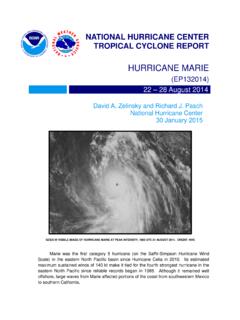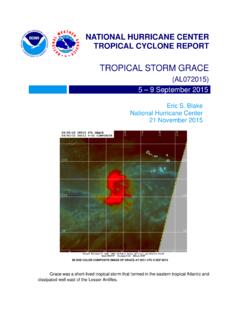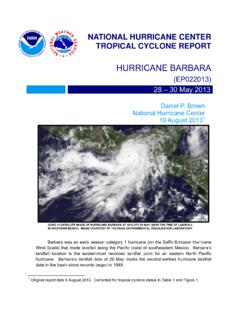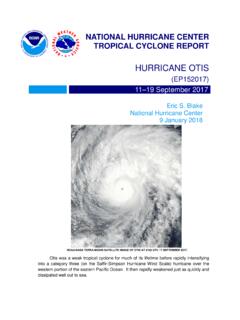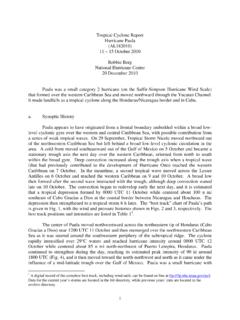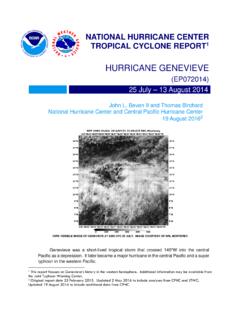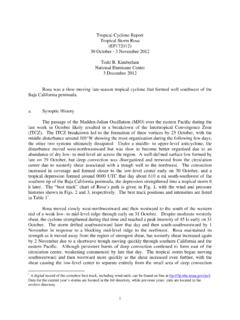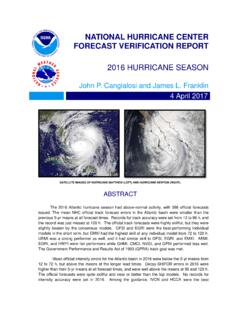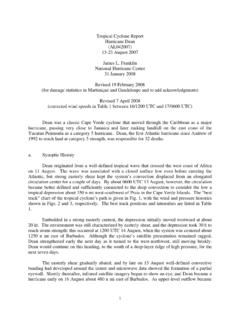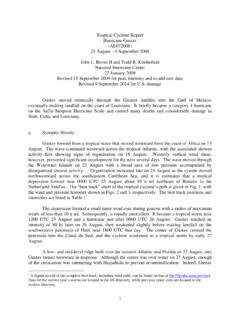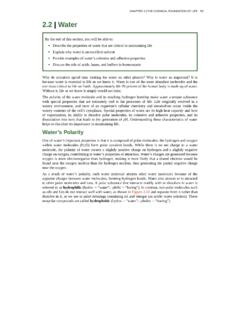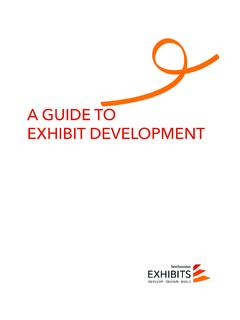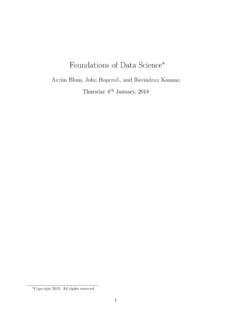Transcription of What is a Tropical Cyclone? - National Hurricane Center
1 what is a Tropical Cyclone? James L. FranklinBranch Chief, Hurricane Specialist UnitNational Hurricane CenterNational Hurricane ConferenceApril 20171 what is an Invest in-vest (IN-vest) n 1. a barbarous transformation of the truncated verb investigate into a noun, along the lines of other recent uncivilized usages such as invite ( , I ll send you a calendar invite?). 2. a weather system for which a Tropical cyclone forecast Center (NHC, CPHC, or JTWC) is interested in collecting specialized data sets and/or running model guidance.
2 (In other words, something we want to investigate further.)ATCF Storm ID Numbering System Automated Tropical cyclone Forecast System (ATCF) has a nomenclature for systems being tracked by forecasters: BBnnyyyy: BB is the basin ( , AL, EP) nnis the system number yyyyis the year AL032017 is the third system to have advisories in the Atlantic basin in 2017 System number 01-49 TCs, STCs, or potential TCs 50-79 reserved for internal use 80-89 system tests 90-99 Investigative Areas INVEST serves as the system name (10-char limit)
3 what it doesn tmean The designation of a system as an invest does not correspond to any particular likelihood of development of the system into a Tropical cyclone Near or before the start of Hurricane season it s not uncommon for NHC to create one or more invests purely to test data flow or model processing scripts. Operational products such as the Tropical Weather Outlook or the JTWC/TCFA should be consulted to determine the significance or potential threat from an Happens Next? Once a system has been designated as an invest, data collection and processing is initiated on a number of government and academic web sites: Naval Research Laboratory (NRL) TC Web Page University of Wisconsin Cooperative Institute for Meteorological Satellite Studies (UW-CIMSS) what Happens Next?
4 NHC is responsible for initiating and updating its invests on the NRL TC page every 12 h (but it s frequently every 6). NHC controls Atlantic invests. Either JTWC or NHC can initiate eastern North Pacific invests. JTWC cyclone GenesisThe Continuum of Cyclones Many types of atmospheric cyclones with different structures and energetics. Cyclones can evolve from one type to another or have characteristics of two types at the same time. Responsibility for different cyclone types is distributed across the NWS.
5 NHC traditionally responsible for Tropical , and subtropical cyclones Beginning in 2013 (post-Sandy) some post- Tropical cyclones. Beginning in 2017, potential Tropical cyclones .Hart and Evans cyclone Phase SpaceBeven 1997 Tropical cyclone Definition Tropical cyclone : A warm-core non-frontal synoptic-scale cyclone , originating over Tropical or subtropical waters, with organized deep convection, and a closed surface wind circulation about a well-defined Center . Subtropical cyclone Definition Sub- Tropical cyclone : A non-frontal low-pressure system that has characteristics of both Tropical and extratropical cyclones.
6 Like Tropical cyclones, they are non-frontal, synoptic-scale cyclones that originate over Tropical or subtropical waters, and have a closed surface wind circulation about a well-defined Center . In addition, they have organized moderate to deep convection, but lack a central dense overcast. Unlike Tropical cyclones, subtropical cyclones derive a significant proportion of their energy from baroclinic sources, and are generally cold-core in the upper troposphere, often being associated with an upper-level low or trough.
7 In comparison to Tropical cyclones, these systems generally have a radius of maximum winds occurring relatively far from the Center (usually greater than 60 n mi), and generally have a less symmetric wind field and distribution of the Criteria Tropical cyclone : A warm-core non-frontal synoptic-scale cyclone , originating over Tropical or subtropical waters, with organized deep convection and a closed surface wind circulation about a well-defined Center . Well-defined Center is evaluated subjectively, but proposed operational guidelines have been developed.
8 Determine the largest ellipse in which a Center might be located consistent with the available observations. This defines an area of uncertainty. The Center can be considered well defined if the major axis of the uncertainty area is less than 75 n mi and the ratio of the major to minor axis is less than 2-3. Center Definition ExampleMajor axis = 55 n mi, minor axis = 15 n mi: Fails eccentricity criteriaEvaluating the Criteria Tropical cyclone : A warm-core non-frontal synoptic-scale cyclone , originating over Tropical or subtropical waters, with organized deep convection and a closed surface wind circulation about a well-defined Center .
9 Evaluating the Criteria Tropical cyclone : A warm-core non-frontal synoptic-scale cyclone , originating over Tropical or subtropical waters, with organized deep convection and a closed surface wind circulation about a well-defined Center . Some of the most contentious internal NHC debates are about whether a particular system meets the organized deep convection requirement. Rely on Dvorak classifications to help remove some of the subjectivity (usually require a or ). Require persistence (convection that only lasts 6-12 hours is not considered organized).
10 Evaluating the Criteria May 2009 low (AL90) in the Gulf of Mexico was problematic because it didn t develop a well-defined Center until right about landfall, but also because the convection (as measured by the Dvorak T-numbers) were high enough only for 6-12 h. Had the system remained over water, the convection would likely have persisted, but we don t name storms based on what might have happened had the system done something :15 AM 10 October 16 GALELWhy be Particular about Status? As scientists, we have an obligation to the truth There are financial consequences to the analyzed status of a system ( , insurance coverage, deductibles, other financial instruments).
